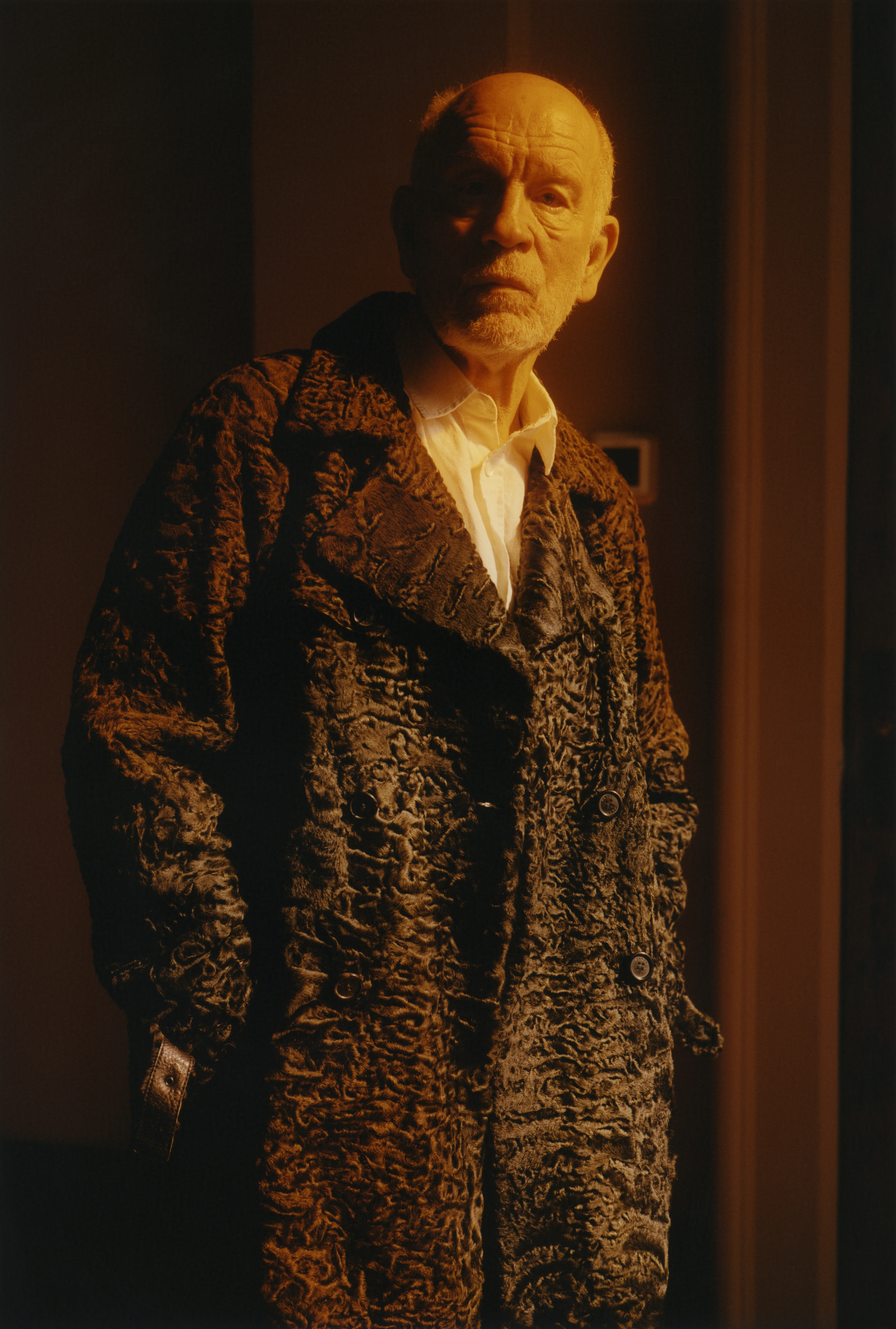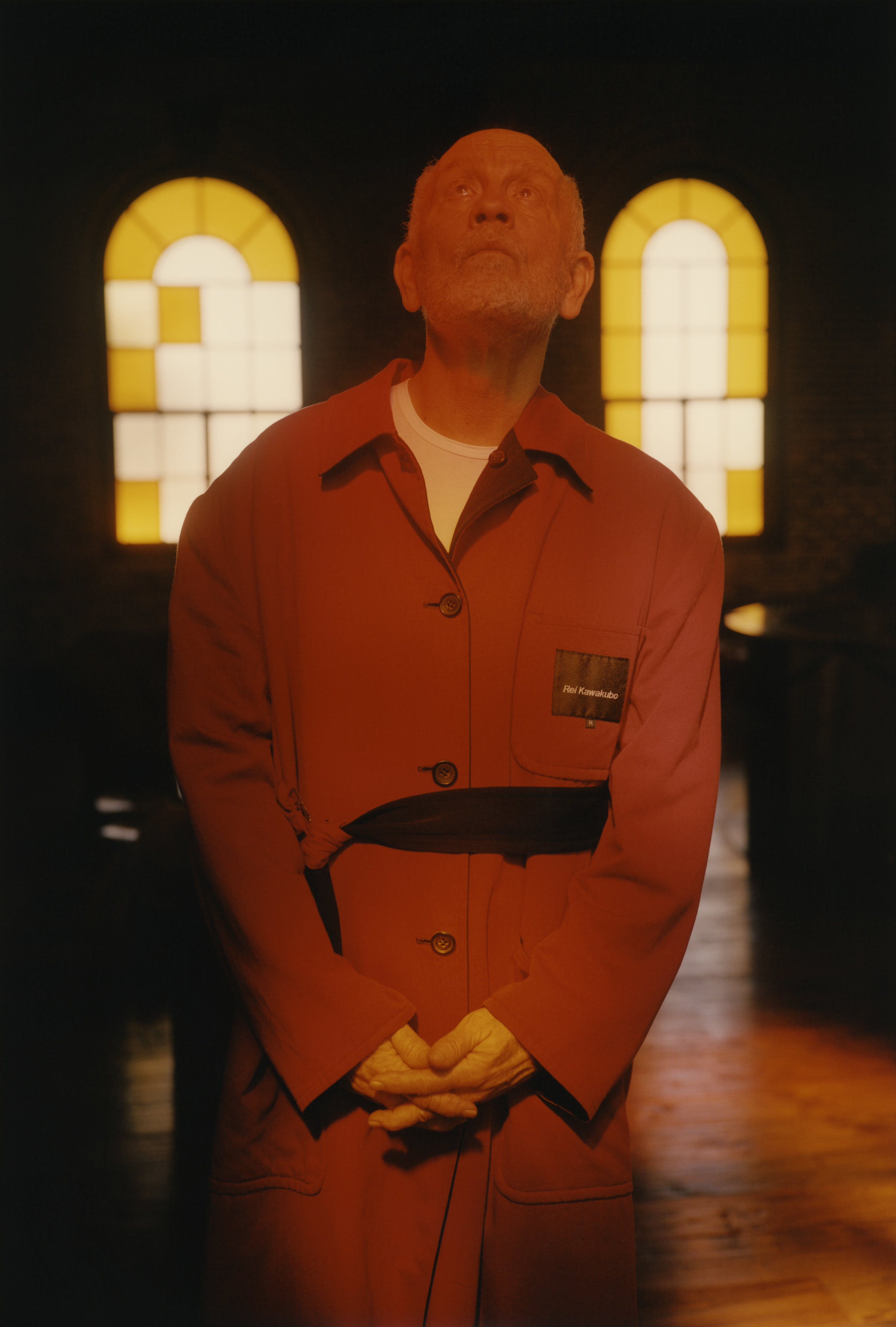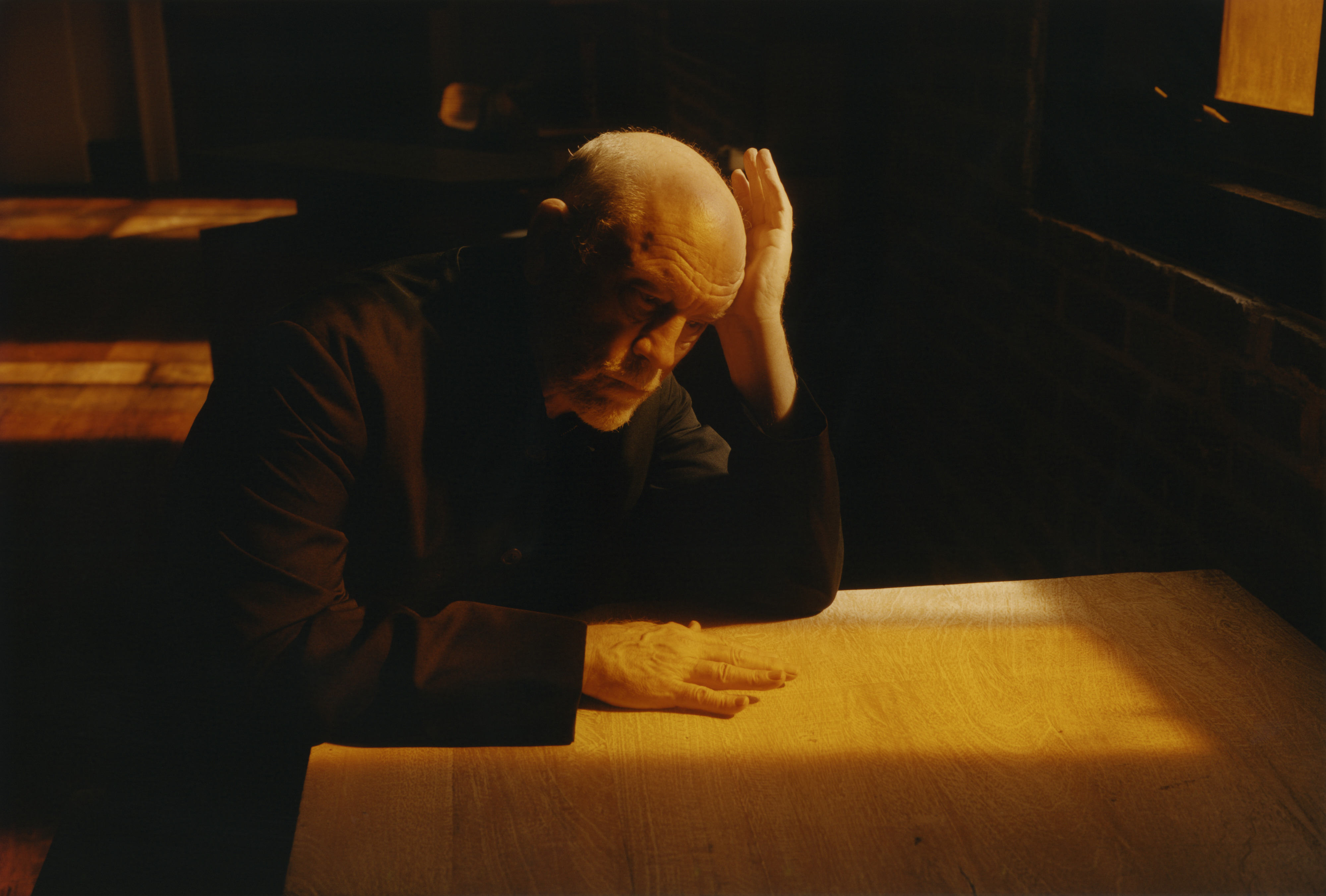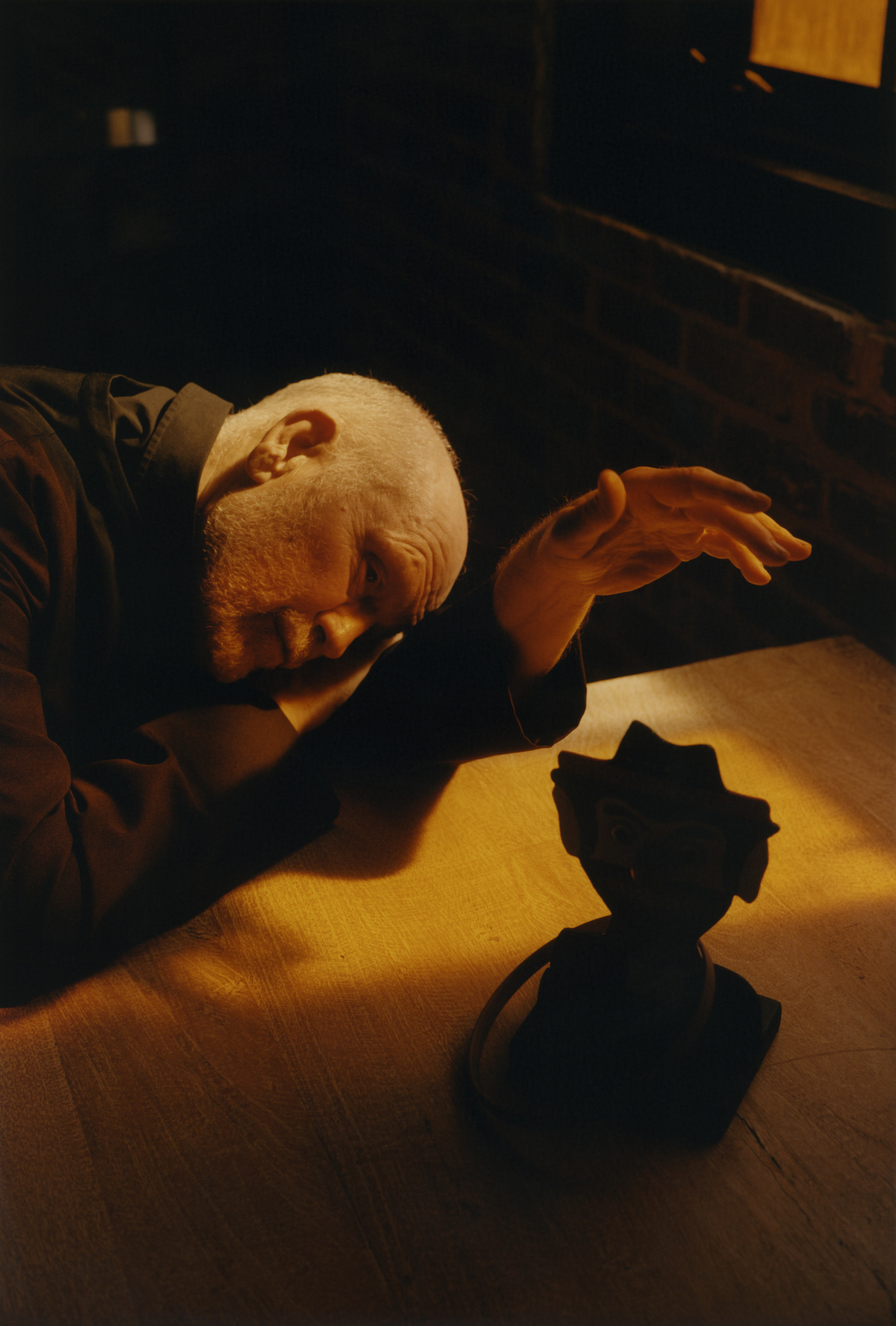There is meta in John Malkovich’s madness

Coat archive PRADA courtesy of 100percerti and Prada Archive-E and shirt CANALI
He let Spike Jonze use the inside of his head as the plot of a film. He’s designed 24 menswear collections, one of them named after himself. Now a new film, Opus, sees this 71-year-old double Oscar nominee play Moretti, a mysterious cultural titan who leads a young reporter (Ayo Edebiri) on a merry dance into his psyche.
Culture
Words: Nicolaia Rips
Photography: Colin Dodgson
Styling: Danielle Emerson
Taken from the spring 25 issue of THE FACE. Get your copy here.
An ambitious but green reporter crosses paths with a reclusive icon, a figure that holds great fascination for the rest of the world, resulting in an interview that for, better or worse, changes her perspective on life. Why has she, unremarkable writer that she is, been chosen to interview this great man? Where does this mysterious figure live, and why is there so much secrecy around it? And should we even care?
What I have sketched out is the rough plot of A24’s Opus, written and directed by Mark Anthony Green and starring John Malkovich as an egomaniacal, reclusive pop star named Moretti. This is also the plot of this piece, written by me, an ambitious young reporter with a sort of wilting greenness one might find in spinach left about a week too long in the refrigerator, and starring John Malkovich as Moretti. Of course, there the similarities end: in the movie there is also a cultish fixation on oyster shucking and murder.
For 30 years Moretti has been hiding. Now, though, he’s back, his long-awaited comeback album billed as his magnum opus – “the greatest album of modern times”. But it’s also a Trojan Horse intended to lure his frenemies in, with Moretti intent on ladling out revenge on a cluster of media heavyweights who have wronged him with bad reviews and untrue profiles. Malkovich’s Moretti is a smooth criminal, a potent combination of Prince, Bowie and Bush (Kate). Early in the film the young reporter (played by a radiant Ayo Edebiri) explains her career goals to her disinterested situationship, something along the lines of (and I paraphrase): “I want to write about celebrities because they’re interesting and that will make me seem interesting because I write about them and I want others to find me interesting.”

John wears hoodie SUNSPEL, trousers FERRAGAMO, sunglasses PUMA and shoes PUMA KING INDOOR
Green, the writer and director, was a GQ writer before he came up with Opus, so he knows his way around the strange world of celebrity. His film, then, is a satire of that world of: iconography, mythmaking, fandom and what decades of fame and acclaim can do to artists who long ago ascended to the Mount Olympus of their profession. Could John Malkovich – with 71 years on the clock, with a career five decades deep, with 147 IMDb credits, with an entire film about being him – possibly relate? Has he, for example, ever held a grudge?
“Not really, no,” he replies evenly as he beams in from an off-the-record hideout somewhere in America. “I’m not much of a grudge holder, period.” In fact, it transpires, he revels in other people’s assessment. “Last autumn I was touring in a piece called The Music Critic, which is a classical music collaboration I’ve done for a number of years with classical music colleagues and friends. Essentially it’s all the worst reviews of all the greatest pieces of music, and of the person who conceived and wrote the piece, and of myself, and we both perform in the piece. It doesn’t bother me at all. It’s a lot of fun, actually.”

Coat archive PRADA courtesy of 100percerti and Prada ArchiveE and shirt CANALI
This is Malkovich’s second time gracing the pages of THE FACE. The twice-Oscar-nominated actor was previously in the magazine 25 years ago, in the first issue of the new millennium. While the cover star was Spike Jonze, the subject was the skate-kid-turned-director’s new film: Being John Malkovich. For anyone who’s not seen the magically meta movie, written by Charlie Kaufman, it should move to the top of your Letterboxd watchlist. But before it does, here’s the plot as recounted in that January 2000 issue:
“Being John Malkovich stars John Cusack and Cameron Diaz as married losers – he plays an unemployed puppeteer, she plays a messianic animal lover, and neither actor has ever looked so skanky. After securing a job as a filing clerk on the low-ceilinged seven-and-a-halfth floor of a New York office block, he discovers a secret corridor. It leads into the brain of John Malkovich, the actor. John Malkovich plays himself. Soon,Diaz is having an affair with her husband’s colleague (Catherine Keener), but only when she (Diaz) is inside Malkovich’s head. Jonze plays none of this stuff for laughs, really.”
Now, Malkovich is the oldest cover star in the history of the magazine. And the legacy of Being John Malkovich, beyond introducing the wider world to Kaufman and Jonze, is that it’s become a gold standard in the history of alternative cinema – commercial success achieved via creatively uncompromising work. And the legacy for its subject? A lifelong marriage to the meta. “Probably because of Being John Malkovich, that kind of meta world has landed me with certain kinds of choices like Colour Me Kubrick,” he says of the 2005 comedy in which he played Alan Conway, a real-life “failed travel agent” and con-man from North London who spent several years pretending to be A Clockwork Orange director Stanley Kubrick, “where [I played] somebody who wants to be a celebrity, or somebody who is a celebrity, [or] who maybe doesn’t want to be.”
But as he points out, while “I’ve played a number of famous people… I’ve played many more not-famous people. It’s not a huge interest of mine.” Malkovich, though, is firm on one thing. “I’m not John Malkovich in Being John Malkovich – it’s a fictional character. We happen to have the same name.” And the same head, which is currently bobbing up at me. Over video Malkovich is a lot of forehead. The angle of his camera is so high that every so often he is lost downward, causing me to stare just at his noble brow. But what a brow! Mostly bald, with distinct wrinkles, dramatic eyebrows, and beneath them, cool hard eyes. Eyes that Kaufman once described as a manifestation of the actor’s unknowability: “You can’t look at his eyes and know what’s going on inside his head. You’re closed off.”
“I think there is a price to pay for doing what you want. It’s not free and you have to be willing to accept that price”

Coat archive PRADA courtesy of 100percerti and Prada Archive and shirt CANALI

coat archive COMME DES GARÇONS courtesy of 20age and T‑shirt MARGARET HOWELL
John Malkovich was born in Christopher, Illinois, a small town south of Chicago. His father was a conservationist and his mother’s family owned and operated the Benton Evening News. Malkovich describes a rowdy childhood filled with competition and family fighting. In 1976 he joined the Steppenwolf Theatre Company in Chicago. Steppenwolf’s impact on contemporary theatre is a different piece but, for Malkovich, the company provided a vehicle for him to hone in on his craft at the very outset of his career.
“We had nights where absolutely nobody came [to theatre shows],” he begins, talking in his trademark staccato vocal rasp. “I’m sure it must have hurt us, although we laughed a lot about it, I’m sure we must have suffered disappointments and losses.” He shrugs. “I think there is a price to pay for doing what you want. It’s not free and you have to be willing to accept that price.” He talks of Chicago fondly, almost wistfully. “I think it was a place to form your work, find your work and refine your work. In Chicago really you’re left alone, nobody cares. And that, unlike what most people think, is kind of critical to helping you find yourself. We did our plays [and] we were happy doing that. No one really particularly approached us with different options or possibilities for a different life, and we weren’t at all unhappy about that.”

jacket archive YOHJI YAMAMOTO courtesy of 20age

jacket archive YOHJI YAMAMOTO courtesy of 20age
Unlike Chicago, New York – where Malkovich moved to star in more Steppenwolf productions – provided careerist temptation. “Our first play in New York, I was 28 or 29. New York really is a place to be dis- covered before, during, or after you’ve refined your work. It’s a little too much attention.” After receiving critical acclaim for his role in Sam Shepard’s True West, Malkovich transitioned to film. At the ripe young age of 34, Malkovich’s role in 1988’s Dangerous Liaisons playing the seductive but conniving Vicomte de Valmont, landed him name recognition. What’s followed is a career that has earned him an Emmy Award, two Academy Award nominations, two Screen Actors Guild Awards and three Golden Globes, as well as a reputation as one of our greatest living, not to mention fantastically versatile, actors – though it feels he never fully sheds his Malkovichness, instead imbuing each character with the essence.

Coat and shirt LOUIS VUITTON, trousers FERRAGAMO and shoes PUMA KING INDOOR
There’s an intensity that roils beneath each character he plays. Before he starts working on anything he asks himself the following: “Do I like it? Am I moved by it? Do I think it’s funny? Why isn’t it funny? Why doesn’t it compel me? Why doesn’t it touch me? These are the questions that have remained excellent my entire life.” To name but three of those 147 roles: super-criminal Cyrus The Virus in fantastically over-the-top 1997 actioner Con-Air; his titular pontiff who takes over from Jude Law’s comatose young pope in 2020 series The New Pope; or real-life mid-century French couturier Lucien Lelong in fashion drama The New Look, last year’s Apple TV+ series about the lives of Coco Chanel and Christian Dior in Nazi-occupied Paris.
He has not, however, starred in any Harry Potter movies. “I remember reading eight or 10 times that I was gonna be in a Harry Potter movie. But no one ever talked to me about a Harry Potter movie. People would call and say: ‘Aren’t you doing the Harry Potter movie?’” Not that I know of. But, you know, maybe other people know more than I do.”
Now, in his eighth decade, he’s ramping up. With candour rather than braggadocio, Malkovich informs me that he’s working much more than he did when he was younger. “In the last, say, 25 years, I did 24 menswear collections. I designed fabrics, tiles, furniture and whatever. I’m not saying I did any of these things well, but they have a tendency to take up a lot of time.”
Then there are the movies and television shows he wouldn’t have starred in before (also last year, he had a scene-stealing cameo in Netflix’s classy, Andrew Scott-starring Patricia Highsmith adaptation Ripley – another meta move, coming as it did 22 years after he played Ripley himself, in the film Ripley’s Game). He’s adapted or written various pieces – from classical music collaborations to operas. He’s directed plays. Malkovich describes these creative collaborations as “births.” When I point out that it’s a lot of birth to be going through, he levels himself with the camera and tells me: “My theory is we’re constantly being born. You just gotta say: ‘OK, where am I? This looks nice, or this maybe is not so nice.’ That happens until you’re not born anymore.” As he puts it with sombre sincerity: “I am no less curious about the world than when I was a tiny baby. For me, that’s the big gift of my life.”
“My theory is we’re constantly being born. You just gotta say: ‘OK, where am I? This looks nice, or this maybe is not so nice.’ That happens until you’re not born anymore”
Since he can remember Malkovich appreciated fabric and clothing. He’s created multiple clothing lines: Mrs. Mudd, Technobohemian, and also a line named after himself. His favourite wardrobe collaborators on his many notably attired characters include his English costumier on Dangerous Liaisons, James Acheson; the Viennese costumier Birgit Hutter on Klimt (2006); the French costumier Caroline de Vivaise, with whom he did Shadow of the Vampire (2000); English Costumier Vicki Russell (“quite hilarious”) of Colour Me Kubrick; and Bella Freud, with whom he worked on three fashion films: Strap Hanging (1999), Lady Behave (2000) and Hideous Man (2003).
On the subject of memory: Malkovich doesn’t journal, insists that he isn’t introspective (more on that later) and yet he remembers everything. The above list is basically verbatim – he neatly details exactly which movie they worked on and where each costumier was something from. When I misquote a line in Opus, a punchline where Moretti is accused of having bought and worn Freddie Mercury’s teeth (I accidentally said Elvis, 20 pushups for me), Malkovich immediately corrects it. He is completely literal and that adherence to truthfulness makes any joke even funnier.
Other actors might allow such fastidiousness to become a liability, manifesting in a refusal to relinquish control over one’s own image. Besides a small legal imbroglio with French newspaper Le Monde over defamation (“they’ll be a little more careful in the future, I think”) Malkovich pays little to no attention to what’s written about him. As we might expect from an actor who allowed his persona to become the subject of its own movie, he has developed a remove toward public portrayals of himself. Gazing off screen, he explains: “Critics have their audience… [But] I’m not part of the audience. There may be a critic I particularly like on some particular subject, but really I have to make my own way in my chosen field. I don’t need a critic for that. I’m my own critic.”
As his own biggest critic, Malkovich is least impressed with his performance in a film called Eleni, a 1985 drama in which he played the Greek-American journalist Nicholas Gage, who returns to Greece to investigate the mysterious death of his mother. “I didn’t much care for that,” he says, before adding absently, “I haven’t cared much for many things I’ve done, honestly.” His nonchalance is less indifference and more a symptom of his philosophical orientation. Malkovich doesn’t like to dwell on the past.
When I inquire if he has any questions he hadn’t been asked over his myriad years in the public eye, or if there was anything he wanted to share or correct, he gives me a look so punchy that, if I still had any greenness at all, it is now entirely blanched. “How would I know?” he says with reproach. “I can’t remember all the things I’ve been asked. It’s not like I think I wasn’t asked enough and I had something more to add.”
He shakes his head and I plunge forth: “No burning desire to tell anybody what you ate for breakfast?” Another, even sterner look. “I love breakfast, but I almost never eat it. I have a tendency to gain weight, so I usually do 16/8 as a lifestyle. For years I stayed thin by essentially just not eating. When I had a play, I didn’t eat till after the play, so one meal a day. That was always fine for me, I have the metabolism of a brick.”

Coat and shirt LOUIS VUITTON and trousers FERRAGAMO
Breakfast and possible French newspapers aside, his relationship with the press, in stark relief to his character in Opus, is one of mostly admiration. “My grandmother was the publisher of a daily newspaper and all my family were journalists and I have many friends who are journalists.” Now he reads too much for work to indulge a media diet. “I used to love to read some of the English tabloids, especially for the summer tourist wars between the Germans and the English, which I always enjoyed greatly – [the] ‘Who gets the sausages and who gets the deck chairs?’ sort of thing.”
Malkovich’s wry and dry sense of humour, with a topspin of world-weary detachment and nonchalance about self, may help explain why Kaufman and Jonze picked him as the subject of their film fantasia. Malkovich wasn’t so sure: he tried to convince Kaufman to make it Being Tom Cruise instead. Being John Malkovich is an artistic tour de force – a brave and strange theatrical sacrifice on the part of Malkovich, a glorious performance that would have sunk the career of a lesser actor, trapped them in themselves.
Still, since then, patterns have emerged in Malkovich’s roles. There are scripts that feel distinctly Malkovichian. Maybe they have a meta element, a film within a film, or a certain cheekiness, a refusal to give in to reality, a festering in the purgatory between how one is and how one is viewed.
Movies of that ilk include The Shadow of the Vampire, a fictionalised account of the making of the original 1922 Nosferatu (itself an unauthorised adaptation of Bram Stoker’s Dracula) in which Malkovich plays F. W. Murnau, the German director having hired a real life vampire.… Or Colour Me Kubrick about a con-man impersonator… Or the 2014 photography exhibition Malkovich Malkovich Malkovich: Homage to Photographic Masters where Malkovich was transformed into various icons such as Marilyn Monroe and Albert Einstein… Or the secretive film 100 Years which is currently locked in a safe and due to be released in 2115 (he informs me, with the idea of a smile, that there is no point in me even trying to get a ticket to the premiere because I am already too old)… Or even Opus, a voyage into a parasocial relationship with a musician.

T-shirt UNDERCOVER, trousers LEVI’S and sunglasses PUMA
Malkovich is emphatic though, both to me and in many interviews since Being John Malkovich, that he doesn’t think about himself, despite what his choice in roles might lead you to believe.
“Every actor, for the most part, only ever does self-generated things, and things they would like to see themselves in. I don’t ever do that, really. I choose from amongst which I’ve been chosen for.” How he has become this object of obsession for so many auteurs (such as Steven Spielberg for 1987’s Empire of the Sun or the Coen Brothers for 2008’s Burn After Reading) is not a concern of his. His interiority is something for others to speculate on. “When people ask questions about me, I feel quite uninformed because I’m not someone I think about. I don’t really think about how I feel. It’s only when someone poses a question that I think about me at all. Usually I’m thinking about other things that are completely unrelated. I’ve just never been very deliberative on the notion of self.”
“You put something out and there might be people who love it. But the vast majority of the world will never hear of it and couldn’t care less if you ever lived or ever died”
Not only is Malkovich not deliberative about himself, he thinks we’re all thinking about ourselves too much. Passing thoughts are preserved, snacks are documented and we have willingly opened ourselves up at every step of the creative process for the entire internet to offer criticism. Opus is a cautionary tale about letting those outside forces drive you to madness. Malkovich explains: “You put something out and there might be people who love it. But the vast majority of the world will never hear of it and couldn’t care less if you ever lived or ever died. They have their own issues and problems and things they want to accomplish. You would be in error to expect too much and to imagine a kind of constant adulation and tropical drinks on the veranda.”
Throwing a movie reference in, it’s kind of like that scene in Being John Malkovich where John Malkovich enters his own mind and all he sees are other John Malkoviches. Basically, once you stop thinking about yourself for a moment, you realise that everybody else is only thinking about themselves. Or, if you took the scene literally, everyone else is only thinking about John Malkovich. Is he sure he doesn’t feel like a muse? “Being a muse is funny to contemplate,” he, well, muses. “I can’t imagine how or why that would happen. But, you know,” Malkovich concludes, as only he can, “the world is filled with strange events.”
CREDITS
GROOMER Dylan Chavles at MA+ Group PRODUCERS Katherine Bampton, Julia Levin and Chris Scheurich PHOTOGRAPHER’S ASSISTANT Will Grundy STYLIST’S ASSISTANTS Lulu Bullock and Sierra Estep





